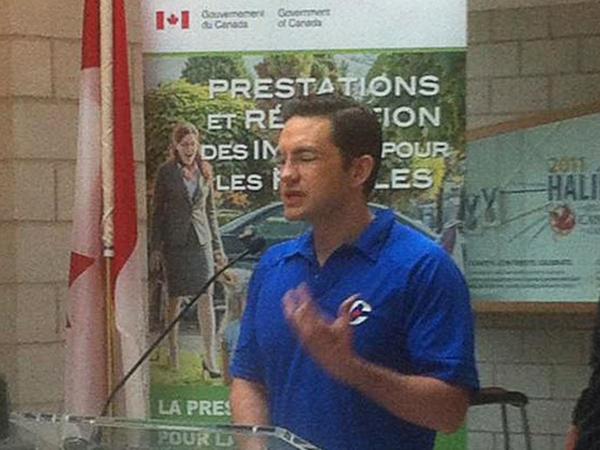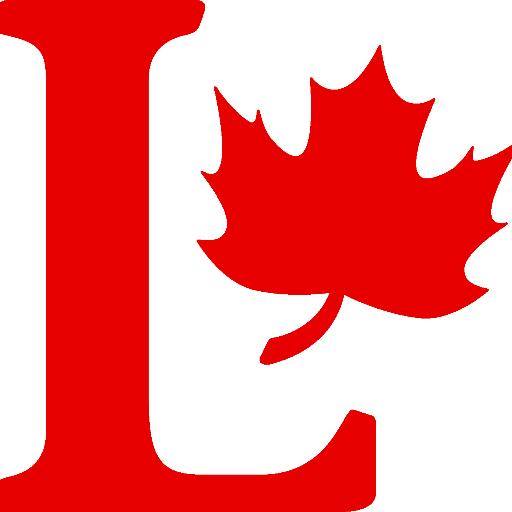
Don’t be fooled: The Grinch will be stealing “Christmas in July”
Smiles for the cameras. Tight Conservative polos made just for the occasion. That’s right, it’s that time of year again. It’s “Christmas in July” – where the Conservatives read your ecstatic tweets about the extra bundles of cash you just received if you are part of a happy family with children. Retroactive to January, the $3 billion payout will mean the first bundle of cash will be big: six months of $160 per kid under 6 and an extra $60 if the kid is between 7 and 17 years old. The taxpayer funded ad campaign says it all, parents with children under 6 will receive nearly $2,000 per year per child and if the child is older than 7, that amount will be $720 per year per child. Everyone should rejoice, Harper’s Conservatives have pulled off a miracle for Canadian families and everyone will benefit from their improved Universal Child Care Benefit. Wait a minute. Cut the cameras, take off the polo and rewind the tape. Does that sound a bit rosy to you?
Families are in for a rude awakening after the election
Canadians with children under 18 woke up more than $360 richer Monday and could be a net $720 per child richer this year! But don’t worry, the grin on Employment Minister Pierre Poilievre’s face is doing more than trying to buy votes, it’s hiding what the Conservatives have in store for your next tax statements.
- The UCCB benefit is taxable federally and provincially, meaning you will lose a chunk of it as part of your income next tax time.
- The child tax credit was quietly scrapped this year. You will consequently lose $337.50 per child per year.
What this means is that net increase of $720 per child just became $382.50 before the taxmen get to it. After taxes, at least a third of that will be gone. Some families may end up only getting $13 per child per month as part of the giveaway, leaving many to pay back large sums to the government once the election is over. It would appear the UCCB is more of a loan than a benefit.
“On the one hand they’re giving more money, on the other hand they’re taking it away,” said tax expert Fred O’Riordan of Ernst & Young LLP.
Canadian Families will spend into the Economy
The unprecedented campaign gimmick has been called one to boost an ailing economy – one that is officially in recession despite “strong economic stewardship.” The $1 billion surplus may have been but wiped out with this measure, but to be fair, it was assumed on 2% economic growth and the bulk of the transactions that made it possible were one-time asset sales. Canada could actually be in a double digit deficit but at this point, the election is in October and the Conservatives have nothing else to turn to. In hopes of jump starting the economy, this “payout” is supposed to incite parents to go out and spend, though many Canadians will likely be straightening their personal balances before contemplating large spending sprees.
It is funny that the UCCB benefit is rolled out as both a goodie for families and an economic stimulant, one that was non-existant in 2009 when families went through the brunt of the financial crisis.
Help us find the 200,000 families that aren’t yet getting the improved UCCB!
But then, it get’s better. Poilievre’s partisan show at a government announcement aside, there exists families who haven’t signed up for the UCCB. That’s right, Poilievre, backed by other Conservative MPs are now trying to find the 30 families in Montmagny, Quebec, 40 families in Dryden, Ontario, 10,000 families in Montreal, 1510 in Quebec City and 32,000 families in Greater Toronto who are missing out on the UCCB! Peculiar how they know these numbers, but not where these families are, especially given the fact that the CRA stores everyone’s tax records and periodically audits when it feels something is fishy. Even more interesting is that each announcement is made in a campaign style bid. The employment minister’s office says 200,000 families are missing from the program and they are working on getting them enrolled.
The Conservatives aren’t the only ones vouching for families
With an election campaign to officially begin this fall, the major federal parties are all vying for the middle class families.
The Conservatives
- Rolled out $3 billion in UCCB (taxable) improvements
- Abolished the Canada Child Tax Benefit CCTB (Not Taxable) – although will not advertise it
- Rolled out $3 billion in income splitting for families
The NDP
- Committed to keep the UCCB (taxable) and the Conservative improvements
- Committed to creating a national $15 per day daycare system
- Committed to abolish $3 billion in income splitting for families
The Liberals
- Committed to abolish the UCCB (taxable), CCTB (Not Taxable), National Child Benefit Supplement (NCBS) (Not Taxable)
- Committed to create a new income-tested Canada Child Benefit (Not Taxable) which will streamline resources of the UCCB, CCTB and NCBS to provide more generous handouts for the middle class
- Families with a household income less than $150,000 will see a net increase from prior payments whereas higher earning families will see a net decrease
- Committed to abolish $3 billion in income splitting for families
- Committed to lower middle class income tax bracket ($44,701 to $89,401) from 22% to 20.5% and introduce a new wealthy income tax bracket (over $200,000) with a rate of 33%
How the parties stack up on combined child benefit transfers
Note: The numbers for Conservative and NDP are before taxes. These numbers are reflective on commitments to date and are subject to change during the campaign should more details about the various party platforms be announced on this matter.
This comparison is taken from the Liberal Party’s Fairness document. Their calculations come with the following disclaimer: “Family with one child under six, family with 2 children who are 4 and 8 years old, family with 3 chidren who are 4, 5 and 12 years old. Harper’s plan figures include the taxable UCCB. Figure is illustrative as varying provincial tax rates would also be applied, and the tax burden of Harper’s plan would vary based on distributions of income between couple parents.”
| Family with 1 Child | Family with 2 Children | Family with 3 Children | |||||||
|---|---|---|---|---|---|---|---|---|---|
| Household Income |  |
 |
 |
 |
 |
 |
 |
 |
 |
| $15,000 | $5,825 | $5,825 | $6,400 | $10,175 | $10,175 | $11,800 | $15,725 | $15,725 | $18,200 |
| $45,000 | $3,350 | $3,350 | $5,380 | $5,900 | $5,900 | $9,850 | $10,050 | $10,050 | $15,800 |
| $90,000 | $2,125 | $2,125 | $3,245 | $3,300 | $3,300 | $5,875 | $6,560 | $6,560 | $10,600 |
| $140,000 | $1,500 | $1,500 | $1,695 | $2,050 | $2,050 | $3,125 | $4,500 | $4,500 | $6,600 |
| $200,000 | $1,425 | $1,425 | $0 | $1,950 | $1,950 | $0 | $3,400 | $3,400 | $1,800 |
The Conservative plan seems rosy on paper and the handouts are but a campaign gimmick. The UCCB improvements come out to the equivalent of a loan when taxes and the elimination of the Canada Child Tax Benefit are taken into account. Poilievre will smile to the cameras and say it’s Christmas in July, but don’t you worry, the grinch will be stopping by next tax season, waiting for you to give the money back – that is, of course, if the next government keeps the current track.



